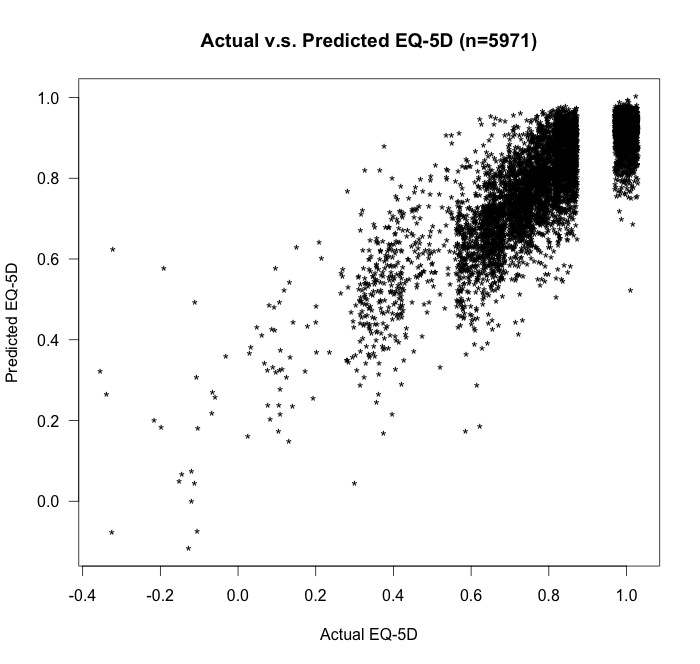Session Information
Session Type: Abstract Submissions (ACR)
Background/Purpose: mANMClinical trials are limited in demonstrating the cost effectiveness of biologic therapies, as these studies often do not collect measures required for economic analysis. Thus we sought to provide a validated algorithm, allowing utility scores to be estimated using mapping (also known as “cross-walking”) of the Health Assessment Questionnaire Disease Index (HAQ-DI) onto a standardized utility measure (EQ-5D).
Methods: We studied 5971 patient visits for 1911 patients included in the Ontario Best Practices Research Initiative, a clinical registry of RA patients followed in routine care (2008-2013). Data were collected every 6 months and include patient demographics, socioeconomic status, clinical variables, disease activity measures, and HAQ-DI and EQ-5D. Each patient’s EQ-5D score was converted to a utility value using a Canadian tariff. EQ-5D utility values were then predicted from HAQ-DI scores using a linear random effects model. HAQ-DI scores were entered as predictors in the model. Random effects for each patient were fitted for intercepts and slopes for the effect of HAQ-DI. Linearity was assessed by fitting non-parametric estimate calculated by mean EQ-5D grouped by HAQ scores.
Results: The estimated fixed effect change in EQ-5D for each point of the HAQ-DI scores is -0.15 (SE=0.0027, P<0.001), with a RMSE= 0.099, and R²=0.68. Examination of the residual plots suggested mild departures from normality with slightly smaller variance for large EQ-5D values (Figure 1). EQ-5D health utility scores showed a ceiling effect, with 1621 observations achieving a utility value of 1 (perfect health).
Figure 1.
Conclusion: Preference based utility values like the EQ-5D can be estimated using measures such as the HAQ. These results are important because they allow for accurate prediction of average utility values from functional measures included in current clinical trials. This model will allow for economic analyses of the benefit of biologic rheumatic drugs in Quality Adjusted Life Years that are meaningful to payers. Future analysis will use each HAQ item to predict EQ-5D utility score, and external validation of the algorithm.
Disclosure:
M. Tatangelo,
None;
G. A. Tomlinson,
None;
C. Bombardier,
None.
« Back to 2013 ACR/ARHP Annual Meeting
ACR Meeting Abstracts - https://acrabstracts.org/abstract/mapping-the-health-assessment-questionnaire-on-a-preference-based-utility-measure-in-a-large-canadian-rheumatoid-arthritis-cohort-results-from-the-ontario-best-practices-research-initiative/

